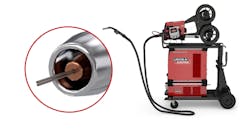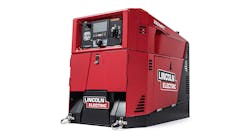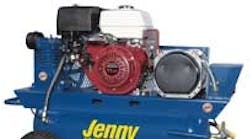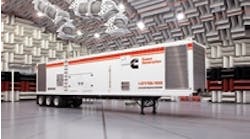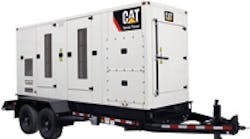Whether in the backyard of a home, on a jobsite, or mixed in the local rental center's fleet, it's tough to go far without finding a small portable generator at work. These units are increasingly common because they do one important thing and they do it well — supply power. And power is needed in just about every residential and professional setting, from supplying backup power during a blackout to powering an entire jobsite's tools and equipment.
Though portable generators do fulfill the simple task of providing power when and where it's needed, the generator unit itself isn't quite so simple. Head over to the local rental center, equipment dealership or big box store and you'll be greeted with a wide selection of generators. There are several different models and price points to consider — from the highest priced units with the most features, to the lowest-cost, most basic models, and those that fall in between. All generators ultimately supply power, but there is quite a difference between top-of-the-line, expensive units and basic, inexpensive models.
Some units include special features designed to reduce noise, run longer and be more fuel-efficient, while others don't do much but start. For all end users and rental center operators, this is where the questions begin: Is the most expensive model with all the bells and whistles necessary? Or will a basic unit with few features be sufficient in meeting needs? To arrive at the correct and most cost-effective answer, it is necessary to examine available generator features and the latest technology.
When it comes to portable, gas-powered generators, the list of options can be about a mile long, so it is important to consider the basic criteria for any unit, regardless of application. Not all generators include every available feature and not every end user requires them all. The following options provide a good, basic list.
The number one consideration for a gas-powered generator is the engine. Because the engine is the driving force behind operation, it won't matter how well the rest of the unit is built if the engine doesn't live up to the highest expectations. The engine's components, such as the air cleaner, fuel tank and muffler can vary greatly in quality, and will have a major impact on longevity, productivity and noise emissions of the generator. Additionally, the Environmental Protection Agency has established four levels for engine emission control standards — Tier I, II, III and IV — with deadlines for each tier of increased standards to be reached, making the emissions status of the engine even more crucial.
Also important is the generator's control panel, which can range from basic to professional grade. A professional-grade control panel includes features designed to increase safety, protect the generator from damage and offer convenience for the operator. High-quality generators are built with an all-inclusive, professional-grade control panel, while less expensive, lower-quality units withhold these items.
Additionally, the construction quality, and components and features found outside of the engine should be top considerations, as well as a warranty program that is backed by a good service network.
Now that the basics are covered, let's apply the information to distinguish the differences in the three basic classes of generators: industrial, consumer and commercial.
Industrial generators
The top tier of portable generator offerings is the industrial generator class. These premium models offer the entire expanse of features and come with a higher price tag to match.
Because industrial generators are the cream of the crop, they're virtually always equipped with a fuel-efficient, EPA-compliant, top-of-the-line engine. Oftentimes, the generator and its engine will be manufactured by the same company, offering the added benefit of providing the customer, whether an end user or rental center, with an integrated unit and warranty policy that covers the whole machine.
In addition to delivering reliability and efficiency, a premium engine incorporates high-quality components — most notably the fuel tank. Typically constructed of steel, a good fuel tank offers a large capacity for several hours of uninterrupted run time, eliminating the need for frequent refueling and excessive downtime. Also offered on most industrial units, an easy-to-read fuel gauge allows accurate monitoring, and a fuel strainer ensures no contaminants enter the tank during refueling.
Other engine components on these units include sound-suppressing mufflers to keep noise emissions at bay, and heavy-duty air cleaners to prevent harmful debris from entering and damaging the engine and to further reduce noise. A low-oil shut-off detects low oil pressure and automatically shuts off the engine, resulting in less maintenance and a longer machine life.
But industrial generators offer more benefits than just those found in the engine. For example, an auto-idle control system conserves even more fuel by lowering the generator's engine to an idle when power is not being drawn from the system, while a dual-capacitor voltage regulation system protects the generator from power surges. External battery chargers offer added convenience, and a full-power switch allows 120-volt full power connection to one receptacle.
High-quality, OSHA-compliant industrial units feature professional-grade control panels that include safety features such as ground fault circuit interrupter receptacles. GFCIs are regulated by OSHA on all jobsites for generators exceeding 5,000 watts because they ensure safe operation by protecting operators from electrocution. To avoid fines or other penalties from OSHA, professional contractors must take note of the generator's control panel. In addition to GFCIs, a professional-grade control panel includes an AC circuit breaker to protect the unit from overload, an hour meter for maintenance tracking, and plenty of 120- and 240-volt outlets to ensure adequate means to power a full worksite's equipment or home backup list.
Industrial generators often feature high-quality construction, including steel frames to protect the unit from damage. And whether standard or optional, industrial generators offer portability-enhancing kits designed to ease transportation from site to site.
For users who require this caliber of generator, the perks are worth the extra cost. Typical users of industrial generators are professionals such as large construction, building and landscape contractors. Rental center operators can also benefit from adding premium, industrial generators to their fleet, as features like hour meters and higher-quality engines allow easier maintenance and serviceability.
Not every contractor or rental center will require a generator this sophisticated, nor will they have budget allotment. As such, two other classes are offered to meet varying needs.
Light-duty, consumer generators
Several types of pared down generators are available in the light-duty consumer generator category. These units are typically designed for end-users who purchase a portable generator simply to have on hand in case of a blackout, or to provide the occasional backup power boost on a jobsite. In other words, light-duty generators are engineered for light use and, therefore, they are not built for the same longevity, sound reduction and fuel efficiency characteristics of their premium counterparts.
Consumer units will supply power, but because of their simplistic design and construction quality, they typically don't last many hours, nor can most take the abuse of a typical worksite or rental application. Consumer generators often skimp on features such as a good control panel, and overall construction and component quality. Because these units are not viewed as an investment, but rather a disposable item, many consumer generator manufacturers forgo features that aid in and encourage routine maintenance, including a warranty program and dedicated service network.
This is not to say that consumer generators don't have a place in the market; they certainly do. They're a low-cost option for those on a strict budget, and for others who may only plan on using the generator once or twice, but prefer to own rather than rent to ensure its availability when needed. Whatever the reason, buyers should go into the purchase realizing the unit may only last them a short amount of time.
Since most contractors, end-users and especially rental center operators are looking for a small return on investment, consumer generators may not offer enough to justify the purchase. But at the same time, many end-users and smaller rental centers are not able to splurge on an expensive industrial model. To address and fill this gap, some manufacturers provide a high-quality, yet lower-cost alternative to expensive industrial styles. These commercial generator units give consumers a bit more bang for their buck and potential for quick ROI.
Commercial generators
An end-user simply looking for a backup power source — whether a residential or commercial application — is unlikely to require an industrial generator, yet will want something more reliable and long-lasting than a cheap, throw-away unit. Additionally, many contractors, especially smaller ones, may find industrial generators a bit much, both in price and operation complexity. And for rental centers, it's all about customer needs and ROI. For this large group of customers, commercial generators offer a suitable “middle of the road” option.
In their most general terms, commercial generators are a less expensive generator choice compared to industrial models. They still fulfill the basic requirement — supplying power — however don't include all the bells and whistles like their industrial counterparts. The key to commercial generators is that they are able to trim out features without sacrificing the quality, advanced technology and reliable performance of more expensive models.
For starters, a quality engine is key to a high-performance commercial generator. While some consumer generator manufacturers skimp on the engine, commercial units incorporate a high-quality engine. Some also provide a premium-grade warranty that covers the entire unit.
In addition to the engine itself, many commercial generators include quality components like a good muffler to suppress noise and air cleaner to protect the engine. Metal fuel tanks provide durability and the capacity to provide long run time without refueling. And many styles of commercial generators still offer the small, yet valuable add-ins like a fuel tank gauge and strainer.
Automatic Voltage Regulator systems are left out of inexpensive consumer models, but are often found on commercial units. An AVR system is somewhat unique in that it provides precise voltage control and output, making the generator appropriate for sensitive electronic equipment like computers — a valuable benefit most premium industrial units can't even boast.
As with industrial generators, a professional-grade control panel indicates a better quality machine, and many commercial models don't skimp. GFCI receptacles, an AC circuit breaker, and plenty of standard outlets are provided. Commercial generators often include an hour meter for maintenance tracking and service, as well as a low-oil alert light to signal when the lubrication level drops.
Portability needs are a major requirement for commercial generators, particularly for contractors who regularly lug equipment from one jobsite to the next. Many consumer generators don't address this consideration, but commercial units go above and beyond. Some offer wheel kits and wheelbarrow handles to aid in portability ease around the jobsite; many include these as standard features.
Who knew there was so much to small portable generators? While many tend to associate price with quality, it's more important to consider what the unit has to offer and to stack those offerings up against the requirements of the application. Knowing the basics will help end users and rental centers place each unit into one of the three main classes, and help guide the selection process. In many cases, it will be necessary to make the investment and go with an industrial generator. However, a high-quality commercial unit can pack a big punch, and provide reliability, durability and continuous power that homeowners and contractors demand, without blowing up a budget.
Pam Meyer is equipment sales manager for Subaru Industrial Power Products.
